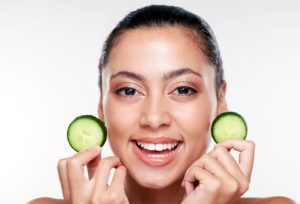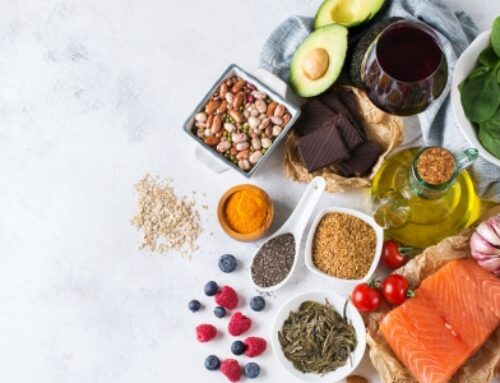
Cleanser, moisturiser and SPF 50+ are the almighty trio when it comes to skin health and maintaining a clear complexion. With a shift towards acts of self-care (especially during lockdown because how else are we expected to spend our time and money except for on copious amounts of sheet masks?) it is no wonder that the Australian beauty industry was valued at USD $3.73 billion in 2020 and forecasted to grow 3.87% from 2021-2026.
Despite the external focus on topical skincare products, there is an intriguing buzz that surrounds food and the potential impacts it can have on our skin.
To be the bearer of bad news, there is no silver bullet when it comes to nutrition and bettering or alternatively, worsening our skin as the research is still emerging.
When it comes to diet and healthy eating, you get out exactly what you put in. Beauty really is an inside job, and our bodies assimilate nutrients from food which can impact the complexion and texture of our skin.
The power of superfoods
For any transition to healthier eating, I always suggest that we need to be adding more into our existing repertoire and focusing more on nourishment as opposed to restriction. As part of this nutrition prescription, a focus on wholefoods (also see: superfoods) is most impactful for not only the appearance of our skin but also hormonal function, sleep, energy levels and other indicators of health. The first point of call for optimising the quality of our diet is to focus on abundance, also known as consuming a wide array of wholefoods across all major food groups.
We know that we can't get all the nutrients we need for healthy growth, development and ageing from one food or food group so it is vital that we consider our overall intake.
When it comes to wholefoods and skin health, Geraldine Georgeou, a Sydney-based dietitian and author of The Australian Healthy Skin Diet corroborates this evidence by suggesting we work towards nourishing our gut microbiomes to unlock the benefits it can have on supporting healthy skin.
Now when I use the term 'superfoods', I am sure you have just teleported yourself into the health food aisle of your local supermarket. Your eyes are glazing over nutrition information panels, and you're stuck wondering if that ah-sigh-ee (acai) powder is really worth the price tag? But bear with me, superfoods can be home branded… I know, crazy right? In my experience, majority, if not all foods in their wholefood form can be considered as super purely because of their own unique nutritional benefits. Here are a few of my skin-loving favourites that I would recommend as part of a balanced and varied diet:
- Leafy green vegetables such as spinach, kale, silver beet and broccoli.
- Berry varieties including strawberries, blueberries, raspberries and goji berries.
- Wholegrains such as rolled oats, brown rice, quinoa and barley.
- Oily fish varieties such as salmon, sardines and mackerel.
- Nuts such as walnuts, almonds and Brazil nuts as well seeds such as pepitas, sesame (or tahini) flax and chia seeds.
Vitamins, nutrients, minerals, oh my!
I have said it before and I'll say it again, food is cool, simply because we know that certain skin-loving vitamins, nutrients and minerals play essential roles in maintaining a healthy complexion.
- Vitamin C: Paramount in supporting the production of collagen whilst brightening and evening skin tone. It also fights inflammation and protects against environmental aggressors. Foods to consider include citrus fruits, berries, tomatoes, capsicum and green vegetables such as broccoli and kale.
- Vitamin A: Prevents against premature and early signs of ageing by increasing cellular turnover for a more regenerated skin appearance. Foods to consider include oily fish, eggs and dairy as well as vegetables such as sweet potato, carrot and leafy greens.
- Omega-3 fatty acids: Serve to regulate skin inflammation by soothing irritation and softening dry or rough skin. Can also help to regulate oil production and balance levels of hydration. Foods to consider include oily fish, walnuts and seeds such as flax and chia.
- Vitamin E: A natural antioxidant that protects against free radicals (e.g. UV rays, environmental pollution and other aggressors) within the skin and helps to moisturise and smooth skin complexion. Foods to consider include nuts and seeds, vegetable oils (acts as an antioxidant within the oil to keep it from going rancid) and leafy greens.
- Zinc: Possesses anti-bacterial properties to help oil regulation and irritation within the skin while also speeding up processes associated with wound healing and formation of collagen. Foods to consider include most proteins such as lean red meat, chicken and seafood as well as nuts, seeds and wholegrains.
To supplement or not to supplement?
When you've upped your wholefood intake and you have your topical skincare routine down pat, the next question turns to "do I need X supplement"? Collagen boosters, energy and sleep supporters, greens powders and inner health elixirs are another consideration within the myriad of ways to support skin health.
Since 2019, the use of collagen supplements for general skin health and complexion has gained interest from those looking to "up their nutraceutical games". With promised benefits of enhancing collagen formation, skin integrity, elasticity, and structure as well as increasing levels of hydration, there is an obvious reason as to why we're all intrigued. Research on the efficacy of oral collagen supplementation is still emerging, however, there could indeed be some validity to these claims. In Thinking Nutrition, Dr Tim Crowe chats about Collagen supplements: legit or insta influencer fair dust?– which is absolutely worth a listen if your sceptical flag is still waving in the wind (1-3).
There are varying opinions as to whether nutritional supplementation for the average person is necessary. While we now know that certain vitamins and minerals provide benefits to skin health, there may be contradictions on a case-by-case basis for someone consuming enough of these essential nutrients in their daily diet.
While the concept of supplementation can be overwhelming, if you're eating a well-balanced and varied diet, there would be minimal need to supplement.
If for any reason your daily diet is restricted due to personal preferences, intolerances or allergies it would be important to talk to your doctor or health care professional before starting any supplement.
Similarly, we know our own bodies better than anyone else and it is important to be mindful of the foods we consume and how they impact our bodies and skin health. If you suspect an underlying condition or illness, always consult your doctor first and if you require specific dietary advice, reach out to an Accredited Practising Dietitian to maximise the most out of your diet while keeping in mind your skin concerns.
- Choi FD, et al. Oral Collagen Supplementation: A Systematic Review of Dermatological Applications Journal of Drugs in Dermatology : JDD; 2019; 18(1):9-16.
- Proksch, E et al. Oral Supplementation of Specific Collagen Peptides Has Beneficial Effects on Human Skin Physiology: A Double-Blind, Placebo-Controlled Study. Skin pharmacology and physiology; 2013; 27. 47-55.
- de Miranda, R.B, et al. Effects of hydrolyzed collagen supplementation on skin aging: a systematic review and meta-analysis. Int J Dermatol; 2021; 1(0):1-13.
If you would like individualised dietetic support with your skin health or any other nutrition concern, come in and see one of our dietitians and they can help you optimise your intake!



